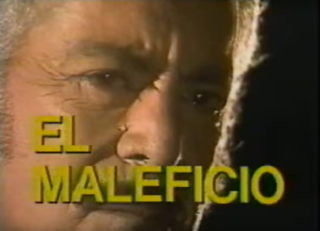Victoria Ruffo is a Mexican actress notable for her roles in telenovelas.
Caridad Bravo Adams was a prolific Mexican writer and the most famous telenovela writer worldwide.
Corazón salvaje is a Mexican telenovela, which was produced by and broadcast on Televisa in 1977. It is the fourth of five screen adaptations of the novel of the same name by Caridad Bravo Adams, and the second telenovela. The first telenovela starred singer Julissa while the 1977 production starred singer Angélica María who had previously had the role of Mónica in the 1968 film version. Actor Ernesto Alonso produced this version and after not casting Julissa and instead repeating Angélica María the first allegedly declared "Since my father (Luis de Llano) is not employed in this company (Televisa) anymore Ernesto Alonso has forgotten me in his castings".

Fernando Colunga Olivares is a Mexican actor known for his work in Mexican telenovelas. Colunga received his drama education at CEA.
Sentimientos Ajenos is a Mexican telenovela produced by José Alberto Castro for Televisa in 1996. Based on radionovela Dos mujeres y un hombre, writer by Arturo Moya Grau.
Heridas de amor is a Mexican telenovela produced by Roberto Hernández Vázquez for Televisa in 2006. It is a remake of the telenovela Valeria y Maximiliano (1991-1992).

Destilando Amor is a Mexican telenovela produced by Nicandro Díaz González for Televisa in 2007. It is a remake of the 1994 Colombian telenovela Café, con aroma de mujer.

Hoy is a Mexican television daily morning program genre varieties produced by the company Televisa SA de CV. Since its first transmission in 1998, the program has several stages, sections and wires, taking as central to entertainment, horoscopes, episode recaps and previews for currently airing telenovelas, beauty, cooking, health/nutrition, and games/sketches, humor and music. Hoy is a show produced by Televisa live and broadcast on Las Estrellas weekdays at 9am.
La leona is a Mexican telenovela produced by Televisa and broadcast by Telesistema Mexicano in 1961.

El maleficio is a Mexican telenovela produced by Ernesto Alonso for Televisa in 1983. The telenovela was so successful in 1983 that a sequel was made under the title of El maleficio 2: Los enviados del infierno in 1986.

Viviana is a Mexican telenovela produced by Valentín Pimstein for Canal de las Estrellas in 1978.

Senda de gloria is a Mexican telenovela produced by Ernesto Alonso for Televisa in 1987. The telenovela recreates historical events in Mexico between 1916 and 1939. It starred by Eduardo Yáñez, Julieta Rosen, Ignacio López Tarso, Blanca Sánchez, Roxana Chávez and Anabel Ferreira.
Monte calvario is a Mexican telenovela produced by Valentín Pimstein and Angelli Nesma Medina for Televisa in 1986. It is an original story Delia Fiallo of and directed by Beatriz Sheridan.

Serafín, is a Mexican telenovela produced by José Alberto Castro for Televisa in 1999.
Nuevo amanecer is a Mexican telenovela produced by Ernesto Alonso for Televisa in 1988.
El vuelo del águila is a Mexican telenovela produced by Ernesto Alonso and Carlos Sotomayor for Televisa in 1994-1995. Telenovela based on the Mexican soldier and President of Mexico Porfirio Díaz, from his name had come out the title "Época Porfiriana" or "Porfiriato" during the period of his rule, in the years 1876-1911.
Canción de amor is a Mexican telenovela produced by Luis de Llano Macedo for Televisa in 1996.
Una luz en el camino is a Mexican children's telenovela produced by Mapat L. de Zatarain for Televisa in 1998. It is an adaptation of the 1991–1992 Argentinian children's telenovela El árbol azul.

Y mañana será otro día is a Mexican telenovela produced by Carlos Moreno premiered on Las Estrellas on 16 April 2018. It is an adaptation of the 2009 Chilean telenovela Cuenta conmigo created by José Ignacio Valenzuela.The production started on February 26, 2018 at Forum 11 of Televisa San Ángel. It stars Angélica Vale as the main character.











